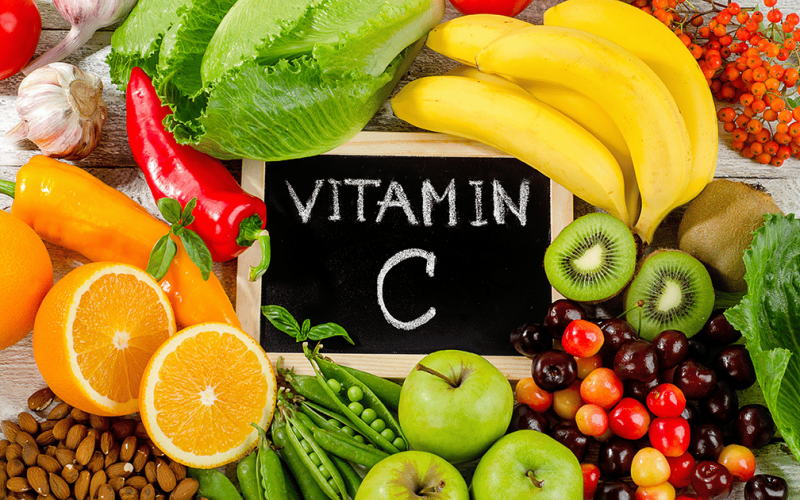Vitamin C is an essential nutrient for the maintenance of good overall health. A lot of us know it as that tasty medication kids love, but it’s more than that. Vitamin C helps with the formation and maintenance of skin, bones, and blood vessels.
This vitamin occurs naturally in some foods, such as vegetables and fruits. They are also available in supplements, for people who don’t get enough of it from their diet.
Vitamin C is also known as ascorbic acid, L-ascorbic acid, or L-ascorbate.
Vitamins are organic compounds, and that includes vitamin C. An organic compound is described as one that contains the elements of carbon and oxygen and exists in living things.
Vitamin C is a water-soluble vitamin, and the human body does not store it. To maintain the right levels of vitamin C, humans must get a daily intake of foods that contain it or use supplements.
Vitamin C plays an essential role in a wide range of bodily functions, including the production of L-carnitine, collagen, and some neurotransmitters. Vitamin C also helps to metabolize proteins, and its antioxidant activities can help lessen the risk of certain cancers.
Collagen, which is produced by vitamin C is the major component of connective tissue, and it also doubles as the most abundant protein in animals. An interesting fact you probably never knew is that between 1 to 2% of the muscles in your body are collagen.
Collagen is an essential component in fibrous tissues like:
- Ligaments
- Tendons
- Skin
- Cartilage
- Cornea
- The gut
- Bones
- Blood vessels
When it comes to the healing of wounds, research as far back as 1942 suggested that injuries of people who had scurvy took longer to heal.
Scurvy is a condition that results from a deficiency of vitamin C. These symptoms include bleeding gums, swollen joints, and loose teeth, tiredness, and anemia.
Rebound scurvy can occur if an individual takes exceptionally high doses of vitamin C and decides to discontinue it quickly.
Wound healing, tuberculosis, and infections
In 1982, a study carried out concluded that cuts, wounds, and grazes might heal quicker in individuals who have a higher vitamin C intake than is often available from the foods they eat. The reason for this may be that vitamin C contributes to the production of collagen.
The role vitamin C plays as an antioxidant also helps to fix tissues and lessen damage from oxidation and inflammation.
People who have the right levels of vitamin C are believed to be able to fight off infections better compared to those who have a vitamin C deficiency.
Also, vitamin C can aid the prevention of acute respiratory infections, especially in individuals with malnutrition and people who are physically stressed.
Researchers have also discovered that vitamin C can be a fast cure for drug-resistant tuberculosis (TB) in a lab culture. A research study published in 2013 suggested that including vitamin C to TB medication could shorten the time of therapy.
Vitamin C and cancer therapy
Vitamin C assists with the treatment of different types of cancer. As an antioxidant, vitamin c protects the body against oxidative stress and assists with the prevention of the oxidation of other molecules. Vitamin c also appears to regenerate other antioxidants in the human body.
Oxidation reactions are known to produce free radicals, and free radicals can begin chain reactions that cause damage to cells.
It has been discovered that high doses of vitamin C can help to lessen the speed of growth of specific cancerous tissue. Scientists have proposed the use of vitamin C in the treatment of cancer patients whose options of treatment are limited.
More research is required for the understanding of how cancers could be affected by adding vitamin C to treatment as well as it’s effectiveness and the long-term effects of its use.
Some researchers have kicked against the use of vitamin C in the treatment of cancer.
However, In 2013, researchers found proof that giving cancer patients high doses of intravenous vitamin C might be of benefit. A study carried out in 2015 confirmed its effectiveness.
The National Cancer Institute has reported several studies where a high dose of vitamin C was used intravenously with very few side effects.
A good number of doctors are in support of it and are already making use of it in cancer treatment.
Nevertheless, the United States Food and Drug Administration (FDA) is yet to approve the use of intravenous vitamin C as a treatment for cancer patients, including patients undergoing radiation therapy and chemotherapy.
This means that the intravenous administration of vitamin c use is not recognized as a treatment.
Other benefits
Asides those mentioned above, other benefits of Vitamin C intake include the following:
- Cholesterol levels: While high levels of cholesterol are a common problem, it was found to be lower in people with the right levels of vitamin C.
- Cardiovascular health: Adequate intake of vitamin C may help to widen the blood vessels, which could help to protect people against hypertension, or high blood pressure, and heart disease.
- Cataracts: Vitamin A is associated with healthy eyes, but Vitamin C may help to reduce the risk of cataracts and age-related macular degeneration.
- Diabetes: Patients of diabetes are less likely to suffer a deterioration of the eyes, kidneys, and nerves if they feed on plenty of fruit and vegetables that have high vitamin C content.
- Anemia: When it comes to the natural absorption of iron, Vitamin C is helpful.
- An adequate intake of vitamin may also help to reduce Lead levels.
- Histamine: The substance produced by the immune system that results in inflammation and other medical issues is known as Histamine. A study carried out in 1992 found that people who took 2 grams (g) of vitamin C daily had lower blood levels of histamine.
- Seasickness: In a research carried out recently with 70 people who either took 2 g of vitamin C or a placebo and later spent 20 minutes on a life raft in a wave pool, it was discovered that those who took the supplement had lower levels of seasickness.
Can vitamin C treat the common cold?
One of the most famous uses of vitamin C is as a treatment for the common cold, but any research has not confirmed this popular belief.
However, the intake of large doses of vitamin C may indeed protect individuals who are exposed to cold temperatures and severe physical activity.
People who have low levels of vitamin C, because of old age or smoking, for example, may have to use supplements as they will be beneficial.
Sources and requirements
The daily vitamin c requirement for Adult males is 90 milligrams (mg), while the daily need for adult females is 75 a day, per the National Institutes of Health (NIH). Pregnant women are required to take 85 mg of vitamin c a day and 120 mg daily while breastfeeding.
The FDA recommends a daily value (DV) of 90 mg for vitamin C. There are severe food sources of vitamin C, but the best sources are fresh fruit and vegetables.
While some vitamin C sour essential can be cooked, heat and cooking in water may destroy a reasonable amount of the vitamin C content, and that makes raw foods the best option.
Foods that contain vitamin C include:
- A half-cup of sweet, red pepper: around 106% of DV or 95 mg.
- One medium-sized orange: around 78% percent of DV or 70 mg.
- A half-cup of fresh strawberries: around 54% of DV or 49 mg.
- Half a cup of spinach: 9 mg or 10% of DV.
There are other good vitamin C sources, including citrus fruits, potatoes, and tomatoes.
In developed countries, a good number of people get the right amount of vitamin C, even though some group of people is more likely to have a vitamin C deficiency.
The more likely groups to suffer a vitamin c deficiency include:
- Smokers and passive smokers
- People with limited food variety
- Infants who are fed with evaporated or boiled milk
- People dealing with malabsorption and some chronic illnesses
Smokers are one of the group of people who have lower levels of vitamin C than those who do not smoke, partly because smokers have higher levels of oxidative stress. Also, smoking causes damage and inflammation to the mucous membranes of the lungs, mouth, and throat.
Vitamin C is vital for a healthy mucosa and helps to reduce inflammation, which is why the NIH has recommended that smokers consume an additional 35 mg of vitamin C daily.
Can you have too much?
Yes, you can have too much vitamin C, but it is unlikely to cause an issue. However, a high intake of more than 1,000 mg of vitamin C daily may mean that not all the vitamin C you consume is absorbed in the intestine. Such a situation can cause diarrhea and gastrointestinal discomfort.
Also, a high intake of vitamin C via supplements, rather than through a healthy diet, may lead to kidney stones, and it may expose women to an increased risk of cardiovascular problems after menopause. This has not been confirmed.
People who have hereditary an iron absorption disorder known as hemochromatosis should discuss with their doctor before taking any vitamin C supplement, as high levels of vitamin C may lead to tissue damage.
The maximum RDI of vitamin C for adult females and males is 2,000 mg.
Leave a comment below.





